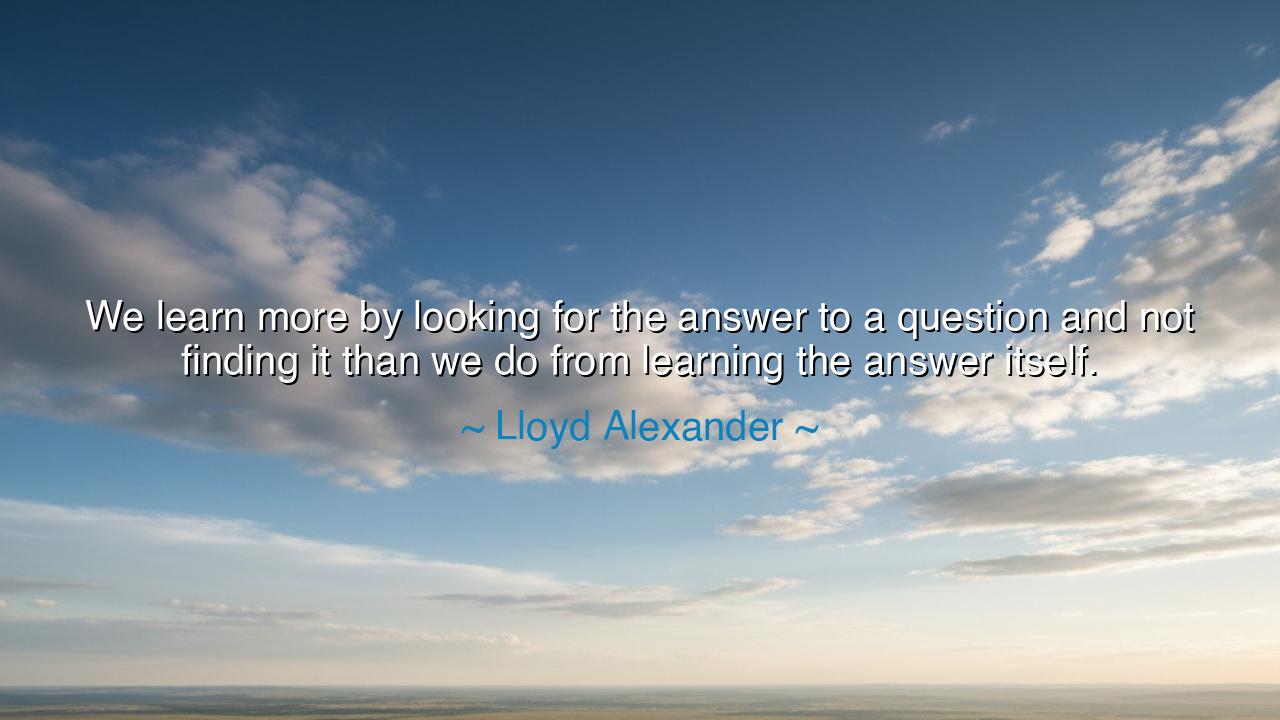
We learn more by looking for the answer to a question and not
We learn more by looking for the answer to a question and not finding it than we do from learning the answer itself.






“We learn more by looking for the answer to a question and not finding it than we do from learning the answer itself,” wrote Lloyd Alexander, the great storyteller and philosopher of imagination, whose tales for the young carry wisdom fit for the oldest of souls. Beneath these words lies a truth that stretches through all of time — that the search is often more valuable than the solution, that the struggle to understand shapes the soul more deeply than the knowledge itself ever could. The question is the flame; the answer, only its brief light.
In this saying, Alexander, who was both a weaver of myths and a student of life, reveals the sacred purpose of curiosity. The act of seeking, he teaches, awakens within us something far greater than mere intellect — it stirs perseverance, humility, wonder, and courage. To look for an answer and not find it is to enter into the mystery of life itself, to accept that wisdom is a path, not a possession. The one who fails to find the answer learns patience; the one who succeeds too quickly learns only satisfaction. Thus, the philosopher, the artist, the inventor — all must learn to love the question, for in the depths of seeking they become more than they were before.
The origin of Alexander’s wisdom lies not in theory, but in the very pattern of human experience. He wrote of heroes who struggled not merely against dragons, but against ignorance, pride, and fear — and in this, his words reflect the oldest truths of philosophy. The ancients taught that true knowledge cannot be handed down like treasure, but must be discovered through effort. Socrates, the sage of Athens, never claimed to possess wisdom; he sought it by questioning endlessly, revealing that the pursuit of truth was itself the highest form of learning. So too does Alexander remind us that the unanswered question refines the seeker, while the found answer often ends the journey.
Consider the story of Thomas Edison, whose search for the electric light spanned more than a thousand failures. Each attempt that ended in darkness was not wasted; each one was a teacher. He famously said, “I have not failed. I’ve just found ten thousand ways that won’t work.” In his search for an answer, he discovered more about perseverance, observation, and the laws of nature than he could ever have learned from a single success. When the light finally shone, it was not merely a triumph of invention — it was the illumination of the human spirit, the reward of a seeker who had learned through not finding.
This quote also speaks to the humility that defines true wisdom. Those who believe they have found all the answers soon stop growing, but those who continue to ask, even in uncertainty, remain alive in mind and spirit. To not find an answer is to remain open — open to deeper understanding, to new possibilities, to the recognition that the universe is far greater than our comprehension. The greatest thinkers, from Newton to Einstein, lived in wonder, aware that every discovery revealed not final truth, but further mystery. It is the question, not the answer, that keeps the soul expanding toward the infinite.
Alexander’s insight also touches the realm of the heart. In our search for love, for meaning, for purpose, we often yearn for resolution — for the “answer” that will complete us. But it is the search itself that transforms us. The pain of seeking teaches empathy; the uncertainty of waiting strengthens faith. Just as a traveler learns more from the road than from the destination, the soul learns more from its wandering than from its arrival. Every unanswered prayer, every question left in the dark, becomes the ground from which wisdom grows.
So, my child of the endless question, take this lesson to heart: do not despair when answers elude you. Let your curiosity be your compass and your uncertainty your teacher. The question that resists solution is not your enemy, but your guide — leading you deeper into yourself, into truth, and into the mystery that gives life its meaning. Seek, not to find, but to grow.
And thus, the wisdom of Lloyd Alexander stands as a lamp for all seekers: that the pursuit of knowledge is not about conquering the unknown, but about being shaped by it. The question refines the mind as the fire purifies gold. Cherish the search, for it is the sacred work of the soul. In the end, the one who continues to ask, though never finding all they seek, will have learned the greatest lesson of all — that wisdom is not in the answer, but in the becoming that happens along the way.






AAdministratorAdministrator
Welcome, honored guests. Please leave a comment, we will respond soon